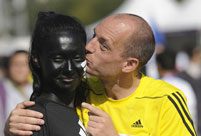CAIRO, Nov. 3 -- U.S. Secretary of State John Kerry, during his first visit to Egypt since the ouster of former president Mohamed Morsi, confirmed on Sunday that the United States would continue its cooperation with Egypt's interim government.
Kerry described Egypt as a "vital partner" at a joint press conference with Egyptian Foreign Minister Nabil Fahmy, held directly after their meeting. He emphasized that the United States is committed to working with the interim government and supporting Egyptians.
Relations between the two countries have been deteriorating since the ouster of Morsi and they further soured on Oct. 9 when the United States suspended its annual military assistance of 1.3 billion U.S. dollars to its Middle East ally. Fahmy had previously said in an interview that there was "unrest" between Egypt and the United States after the aid suspension, saying the strain could affect the whole Middle East.
Kerry attempted to soften the diplomatic tone by stressing that U.S.-Egypt ties should not be "defined by assistance." He added that the suspension of aid, which came after the military toppled the country's first democratically-elected president on July 3, was not a punishment but a reflection of U.S. foreign policy.
"(U.S.) President Barack Obama has worked very hard to be able to make sure that (the suspension of aid) will not disrupt the U.S. relations with Egypt," Kerry said, noting that the topic was mentioned "very briefly" during their meeting.
Commenting on the difficulties facing Egypt, Kerry urged that the political transition be democratic and transparent. "A democratically re-elected government should be brought about by free, fair and inclusive elections," Kerry said.
"We condemn the acts of violence against churches, against worshippers and that on security forces in the Sinai Peninsula," he added, denouncing the rise in attacks against religious minorities and police institutions. He further said the U.S. plans to work with the Egyptian government and the military to fight against terrorism and to restore security in Sinai.
Kerry reportedly held talks later with other top officials including interim President Adly Mansour, Military Chief General Abdel-Fattah el-Sisi and other leaders.
Egypt is the first leg of Kerry's nine-day trip to the Middle East, North Africa, and Europe.
The visit was on the eve of the trial of Morsi and 14 other senior Islamist leaders. They are facing charges of inciting violence and killing protesters. The trial could be Morsi's first public appearance since his downfall.
Morsi, who hails from the Islamist organization the Muslim Brotherhood, was ousted following massive nationwide protests against his one-year rule. He was arrested by the military and has been held in an undisclosed location.
Kerry's last visit to Egypt was in March when he urged Morsi's administration and other political parties to compromise and restore national unity, political stability and economic reforms in the Arab world's most populous nation.
According to the government's transitional roadmap, Egypt will hold parliamentary and presidential elections at the beginning of next year and early next summer respectively.
 Annual airshow kicks off in Houston
Annual airshow kicks off in Houston U.S. Navy Carrier Strike Group stages military exercises
U.S. Navy Carrier Strike Group stages military exercises Volkswagen showcases new energy vehicles in Beijing
Volkswagen showcases new energy vehicles in Beijing  How should we get married nowadays?
How should we get married nowadays?  Commentary:
Commentary: Jakie Chan sees Rubber Duck off in Beijing
Jakie Chan sees Rubber Duck off in Beijing Lingerie show dazzles Wuhan Motor Show 2013
Lingerie show dazzles Wuhan Motor Show 2013  Running in fun customs at Beijing Int'l Marathon
Running in fun customs at Beijing Int'l Marathon  Weekly Sports Photos
Weekly Sports Photos Unveil PLA air force base
Unveil PLA air force base  Say goodbye to tube-like apartment building
Say goodbye to tube-like apartment building Oriental education or western education?
Oriental education or western education? China in autumn: Kingdom of red and golden
China in autumn: Kingdom of red and golden National Geographic Traveler Photo Contest
National Geographic Traveler Photo Contest Chinese screen goddesses from Beijing Film Academy
Chinese screen goddesses from Beijing Film Academy Day|Week|Month